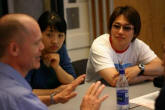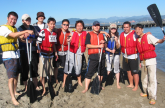INTERNATIONAL GRADUATE STUDY PREPARATION PROGRAM (IGSPP) CanadaThe Centre for Intercultural Communication The Centre for Intercultural Communication at UBC is internationally recognized for providing expertise to enhance the performance of individuals working in international and multicultural environments. With over 20 years of experience, our highly experienced staff have designed and delivered leading-edge programs and services to help international students work more effectively in diverse cultural settings, both internationally and domestically. UBC's Centre for Intercultural Communication partners with university experts, business and community leaders to provide the highest levels of training, site visits, practical experience and discussion forums for its international clients. Program Overview: Higher education at the graduate level in a top western university is a necessity for achieving the career goals of many students. To reach that goal, many students invest years of preparation in study and work, but are still in need of building specific skills for international graduate study. The Graduate Study Preparation Program focuses on building skills for success in international, academic and work environments. These skills include writing for academic and professional purposes, skills for applying and interviewing, skills for effective and informal communication, presentations and interactions, and research skills about the requirements of different graduate study programs. Development of these and many other skills are designed to support each participant's performance in graduate school and professional life when working, living and studying in an international setting. The Graduate Study Preparation Program has been developed by the University of British Columbia's Centre for Intercultural Communication (CIC) to prepare international students to meet these challenges. With two decades of experience in international adult education, CIC has designed this program to provide an elite level, full-time, educational opportunity in English for international students intent on:
The program will take place on the beautiful campuses of the University of British Columbia, Vancouver, Canada and will run for six months. During the program, the participant's time will be spent in both the classroom and community structured activity for the participants each week. The remaining time will be spent in Directed Independent Study to allow each participant to complete his or her assignments, readings and research. Finally, there will be time for Self-directed Community Exploration when participants can follow their own interests (athletics, travel) while practicing their communication skills outside the classroom. The curriculum for the Graduate Study Preparation Program will be divided into eight components:
1) The Communication Workshops will help participants become oriented to life in Vancouver and the expectations and cultural differences of classroom work in North American universities. Participants will build their communication skills, knowledge of local culture and confidence in communicating effectively in English in professional, academic and community settings 2) The Academic Preparation part of the program will include:
3) The Academic Research Skills segment is designed for participants to conduct investigation, both that assigned by their instructors and in areas of their own interest. Examples of research might include background knowledge about the graduate schools to which they are interested in applying, the research interests of potential academic supervisors, opportunities for grant money to support their plan of graduate study, etc. While building general academic research skills, this segment is also an opportunity to practice the responsibilities and ethical considerations widely in use in North America. 4) The Field Studies segment is designed for participants to explore beyond the classroom and to reach into the wider community to develop their skills in the real world, broaden their knowledge of the multicultural elements of Canada and gain understanding of the social philosophies, institutions, businesses and commercial enterprises that sustain communities and their economies. 5) Assigned Project Work will also be part of the curriculum. Working individually and in teams, participants will be asked to pursue knowledge in areas of academic interest and to report their findings to their peers and instructors. Each project team will receive mentorship from our faculty and training in presentation skills to help them prepare their project. 6) Time in the schedule for Directed Independent Study is set aside several evenings each week. During this time participants are expected to complete assignments given by their instructors. This work supports the classroom activities of the program and may involve both working independently or in small groups. 7) There is a range of Socio-Cultural Activities that participants can enjoy while in British Columbia. It is a chance to take part in the cultural life of Canada including music, art, dance, athletics, and general leisure. Participation in these activities will be optional. 8) Self Directed Community Exploration involves free time in the schedule for participants to enjoy and explore the area of Vancouver according to their own interests while also strengthening their understanding of underlying North American cultural values. During this time we encourage participants to practice their language and cultural skills in the community. We feel that this integrated program will best meet the interests of the participants, and enable them to better prepare for graduate study. By providing participants with the general support necessary to take full advantage of the their program at UBC, both in inside and outside of the classroom, participants will build new skills for higher education in a Western setting, improve their English language fluency, and better understand the impact of culture and communication while studying and working in a new environment. Each participant's work in the Communication Workshops, Academic Preparation, Academic Research Skills, Field Studies, and Project Work will be monitored for participation. Successful completion of the program will require the full participation of participants. Participants who do not comply with the program requirements for attendance, assignments and participation will be asked to leave the program and UBC will advise immigration officials of their change of status. Participants who complete the program successfully will receive a certificate of completion from UBC. Participant Support: The Centre for Intercultural Communication will coordinate the program, its content and all related arrangements. This may include: Language Support - The program has been planned assuming that all of the participants will have at least intermediate ability in English, both spoken and written, in order to participate fully in the program. Minimum language proficiency scores are 525 TOEFL or equivalent. Books and Materials - CIC will provide participants with classroom handouts and recommendations for reading materials and reference books. Homestay Orientation - If participants choose to have a
Homestay experience, a review of the homestay experience will be offered to help
them adapt to life with a Canadian family.
|
|
| ||||||||||||||||||||




